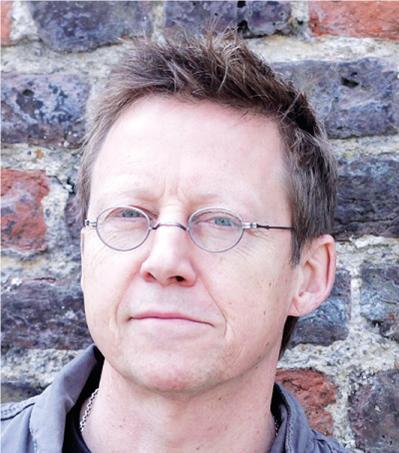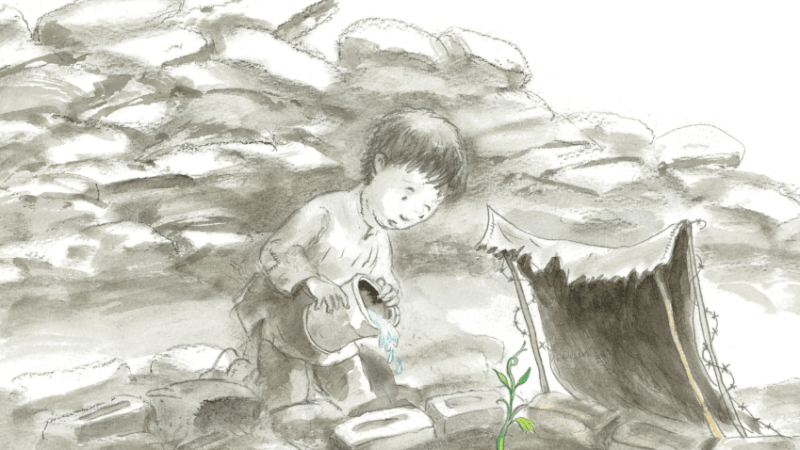Simon Mayo: “A Buzzy, Vibrant Librarian Can Make A Huge Difference”

You can't force children to enjoy reading, says Simon Mayo – but great stories have their own power…

- by Simon Mayo

True story: I actually wrote my first book before I could read. Or write. It’s not as crazy as it sounds; my father and grandfather were both academics, so I grew up with books being created all around me.
As a very little child I’d sit next to my dad and he would scribble on pieces of paper then give them to his secretary, who would type it all out. I deduced from this that the process of ‘making a book’ must be a kind of mind reading, and I wanted to do it, too. I got hold of a notebook and pencil, and ‘wrote’, thinking about a great story all the while. When it was finished, I proudly handed the ‘book’ to my mum; I wanted her to read it, for real, and she couldn‘t. It was quite a shock to realise that there was more I needed to do.
That said, at my primary school (St John’s in Croydon), I do remember reaching the end of the reading scheme they were using, and becoming a ‘gold star’ reader as a result. One of the final books was ‘Magic Everywhere’, and there was a story in it – in my memory, it was called, ‘Long, Tall and Broadsight’, but that doesn’t quite work, because it was about three giants with different qualities. I remember thinking it was wonderful, anyway; I’ve tried to find it online so I can revisit it as an adult, but I haven’t managed to track it down so far.
I think my experience of reading less once I left leaving primary school is fairly typical – I remember enjoying Willard Price’s ‘Adventure’ books when I was thirteen or fourteen, and finding them exciting, but otherwise, it’s like a black hole; nothing else comes to mind. And I can’t stand those ‘100 essential books’ lists that newspapers are always publishing, because I’ve never read any of them. The only ‘classics’ I can tick off, more or less, are the ones I had to write about for English Literature, which was a subject that was a struggle for me. Twelfth Night; The Crucible; Far From the Madding Crowd. I suppose Michael Gove might be pleased to know that there really are some adults in the country who have never read Of Mice And Men.
I know that there’s a huge drive for schools to promote ‘reading for pleasure’; but it seems to me that all authors can do is come up with the best stories they can and hope they get into the hands of people who will enjoy them. If schools are able to provide the ‘raw materials’, then that’s great – and a buzzy, vibrant librarian can make a huge difference. My own children are surrounded by books –and are lucky enough to have met authors like Malorie Blackman, Jacqueline Wilson and JK Rowling, too; thanks to my job. And they do all enjoy reading, I think it drips in by osmosis.
When they were little, I was always in charge of bedtime stories, mainly because I was doing the Breakfast Show at the time, so I wasn’t around in the mornings. At the risk of going over very familiar ground, Harry Potter was a revelation, and a revolution. I’d become so bored of the books we were reading, and then Ben, who was exactly the right age when The Philosopher’s Stone was published, came home and said, ‘Dad, people at school are talking about this book…’ I found a copy at the Waterstones near the BBC, took it home, and read the first chapter to Ben that evening; then sat on the stairs outside his room and just carried on reading, thinking, this is amazing. I’m sure a lot of parents will nod at that. I read the series to all three of my children in turn; the youngest was resistant at first, because clearly, anything the older two had enjoyed must have been rubbish. But I told him I’d read the first chapter, and if he didn’t like it, we’d never mention it again. And of course, The Boy Who Lived is a brilliant opening, and he was hooked.
As for writing, well, the great thing about the 500 Words competition run by the BBC – and other schemes like it – is that it places the emphasis on the right aspects, in my opinion. Coming up with a story, a character with a spark, an idea that gets readers caught up with it – that’s something special, and incredibly rewarding. Obviously, for a written piece in an exam, grammar and spelling will matter, but for 500 Words the message is: just go for it. You’re writing for pleasure – just start, even if it sounds like you’ve dived in halfway through. There’s an enormous liberation in that. It can be difficult these days, I think, for teachers to give children opportunities to write creatively, with no pressure to craft their sentences perfectly. And it’s hard to teach the joy of writing if it’s a chore; so the fact that schools are getting involved with 500 Words in increasing numbers is deeply satisfying.











